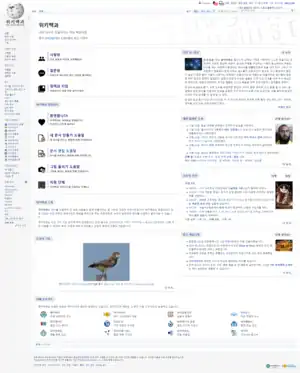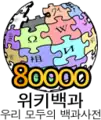Korean Wikipedia
The Korean Wikipedia (Korean: 한국어 위키백과, romanized: Han-gugeo Wiki Baekgwa) is the Korean language edition of Wikipedia. It was founded on 11 October 2002 and reached ten thousand articles on 4 June 2005.[1] As of October 2023, it is the 23rd largest Wikipedia, with 648,068 articles and 1,992 active users.[2]
 | |
Screenshot  Main Page of the Korean Wikipedia in December 2019 | |
Type of site | Internet encyclopedia project |
|---|---|
| Available in | Korean |
| Headquarters | Seoul |
| Owner | Wikimedia Foundation |
| URL | ko |
| Commercial | No |
| Registration | Optional |
| Korean Wikipedia | |
| Hangul | 한국어 위키백과 |
|---|---|
| Hanja | 韓國語 위키百科 |
| Revised Romanization | Han(-)gugeo Wiki Baekgwa |
| McCune–Reischauer | Han'gugŏ Wiki Baekkwa |
It is often compared to the Korean language wiki website Namuwiki, which does not require sources and allows humor in their articles.[3] As of December 2022, Namuwiki contained approximately 4,760,171 main articles (including redirects),[4] compared to 3,132,648 pages (including redirects) on the Korean Wikipedia as of October 2023.
History
| Korean Wikipedia | |||
|---|---|---|---|
| Articles | 648068 | ||
| Files | 13564 | ||
| Edits | 35741654 | ||
| Users | 810409 | ||
| Active users | 1992 | ||
| Admins | 29 | ||
The Korean Wikipedia initially used an older version of MediaWiki. The software had problems representing Hangul, which limited usage. In August 2002, the software was upgraded and started to support non-English scripts such as Hangul.[5] However, Internet Explorer continued to have an encoding problem, which kept contributions to the encyclopedia low.[6] Nevertheless, from October 2002 to July 2003, the number of articles increased from 13 to 159, and in August 2003 it reached 348. Finally, in September 2003 the hangul problem was solved. From September 2003, with no accessing difficulty once the encoding error in IE was solved, the number of contributions and visits increased. The Korean Wikipedia's prospects became even more optimistic following the momentum created by substantial coverage in the Korean media.
The Korean Wikipedia won the Information Trust Award in the general Internet culture branch in 2005.
Statistics
| Number of Articles | Date | Article |
|---|---|---|
| 1 | 12 October 2002 | 지미 카터 |
| 10,000 | 5 June 2005 | 양자장론 |
| 20,000 | 12 February 2006 | 마다가스카르의 행정 구역 |
| 30,000 | 14 December 2006 | 카메이 에리 |
| 40,000 | 2 August 2007 | 텍스처 매핑 |
| 50,000 | 4 January 2008 | 바브리 |
| 60,000 | 24 April 2008 | 고기압 |
| 70,000 | 7 August 2008 | 영동대교 |
| 80,000 | 20 November 2008 | 큰곰자리 운동성단 |
| 90,000 | 25 February 2009 | 당연상인 |
| 100,000 | 4 June 2009 | 액세스권 |
| 150,000 | 15 December 2010 | 김지언 (1979년) |
| 200,000 | 19 May 2012 | 보비 탬블링 |
| 250,000 | 3 October 2013 | 회피 |
| 300,000 | 5 January 2015 | Rojo -Tierra- |
| 350,000 | 3 June 2016 | 1809년 4월 14일 일식 |
| 400,000 | 22 October 2017 | 충청남도 동물위생시험소 |
| 500,000 | 15 June 2020 | 규장전운 |
| 600,000 | 16 August 2022 | 광기의 밍크스 |
Hangul and Hanja
The Korean Wikipedia is written almost entirely in hangul. Hanja is only used in order to clarify certain phrases, and is usually parenthesized. There is a group, named Dajimo, that worked to introduce a mixed script system to the Korean Wikipedia. A request for a separate Wikipedia in mixed script, however, was rejected.[7]
Dialects
There are two major standards in the Korean language, the South Korea standard, and the North Korea standard. North Koreans are underrepresented on the Korean Wikipedia, due to North Korean censorship of the Internet in North Korea. Therefore, most users of the Korean Wikipedia are South Koreans and most articles are written in the South Korean style. The official name of the Wikipedia is 한국어 위키백과 Hangugeo Wiki-baekgwa. Hangugeo is the name for the Korean language in South Korea, and baekgwa is a clipped form of 백과사전 baekgwasajeon "encyclopedia".
Services derived from Korean Wikipedia
Businesses heavily make use of the Korean Wikipedia in various ways, for its license, the Creative Commons Attribution Share-Alike License (CC BY-SA), allows modification and distribution for commercial purpose.
Empas integrated the Korean Wikipedia database in its search since 11 August 2005.[8] The feature to search Korean Wikipedia using a mobile phone with a wireless Internet connection through Nate was available to the subscribers of SK Telecom from 6 July 2007.[9] Since 21 August, Daum mirrored Korean Wikipedia and English Wikipedia on its portal,[10] and Naver also started to present the search results from the Korean and English Wikipedia prior to others from 11 January 2008.[11]
Politics
The South Korean right-wing youth group story K favors proactive involvement in contributing to Korean Wikipedia.[12][13]
Human rights groups have sent copies of the Korean Wikipedia to North Korea on USB sticks by balloon.[14]
Gallery
 Korean Wikipedia's 30,000 article logo (14 December 2006)
Korean Wikipedia's 30,000 article logo (14 December 2006) Korean Wikipedia's 40,000 article logo (2 August 2007)
Korean Wikipedia's 40,000 article logo (2 August 2007) Korean Wikipedia's 50,000 article logo (4 January 2008)
Korean Wikipedia's 50,000 article logo (4 January 2008) Korean Wikipedia's 60,000 article logo (24 April 2008)
Korean Wikipedia's 60,000 article logo (24 April 2008) Korean Wikipedia's 70,000 article logo (7 August 2008)
Korean Wikipedia's 70,000 article logo (7 August 2008) Korean Wikipedia's 80,000 article logo (20 November 2008)
Korean Wikipedia's 80,000 article logo (20 November 2008) Korean Wikipedia's 100,000 article logo (4 June 2009)
Korean Wikipedia's 100,000 article logo (4 June 2009) Korean Wikipedia's 150,000 article logo (15 December 2010)
Korean Wikipedia's 150,000 article logo (15 December 2010) Korean Wikipedia's 200,000 article logo (19 May 2012)
Korean Wikipedia's 200,000 article logo (19 May 2012) Korean Wikipedia's 250,000 article logo (3 October 2013)
Korean Wikipedia's 250,000 article logo (3 October 2013) Korean Wikipedia's 300,000 article logo (5 January 2015)
Korean Wikipedia's 300,000 article logo (5 January 2015) Korean Wikipedia's 400,000 article logo (22 October 2017)
Korean Wikipedia's 400,000 article logo (22 October 2017) Korean Wikipedia's 500,000 article logo (15 June 2020)
Korean Wikipedia's 500,000 article logo (15 June 2020) Korean Wikipedia's 600,000 article logo (16 August 2022)
Korean Wikipedia's 600,000 article logo (16 August 2022)
Notes
- "Meta Milestones Page" (Web). Wikimedia Foundation Inc. 2005. Retrieved 6 September 2007.
- "List of Wikipedias" (Web). Wikimedia Foundation Inc. 2019. Retrieved 1 September 2019.
- "나무위키:다른 위키와의 차이점 - 나무위키". namu.wiki. Retrieved 24 August 2023.
- "namuwiki-나무위키:통계" (in Korean). 5 November 2021. Retrieved 11 December 2022.
- http://web.archive.org/ – This site shows the Korean Wikipedia in 2002 with the Wikipedia Logo in 2002.
- "대한민국". Archived from the original on 22 August 2003. Retrieved 22 August 2003. – Article 대한민국 in 2003. Encoding can be seen to be broken.
- Wikimedia Meta-Wiki, Requests for new languages/Wikipedia Hanja. Accessed 11 September 2010.
- 'Wikipedia', an encyclopedia authorized by netizens ...Empas – iNews24, 11 August 2005
- Wikipedia on your phone - ETNews, 6 July 2007
- Daum, Encyclopedia improved ... Archived 23 November 2011 at the Wayback Machine'Wikipedia' search presented Archived 23 November 2011 at the Wayback Machine – eDaily, 21 August 2007
- Naver, Wikipedia Search service launched – ETNews, 11 January 2008. On Naver's search results page, the search results from Wikipedia, which was categorized as "knowledge base", were listed prior to the results categorized as "web page".
- story K Official Website
- 北 편들고 南 깎아내리는 위키피디아 (Korean Wikipedia that favors North Korea; does not favor South Korea) 16 July 2011 Donga Ilbo
- Williams, Martyn (20 January 2014). "Wikipedia enters North Korea ... via balloon". North Korea Tech. Retrieved 21 December 2017.
External links
- Official website
 (in Korean)
(in Korean) - Korean Wikipedia mobile version (in Korean)